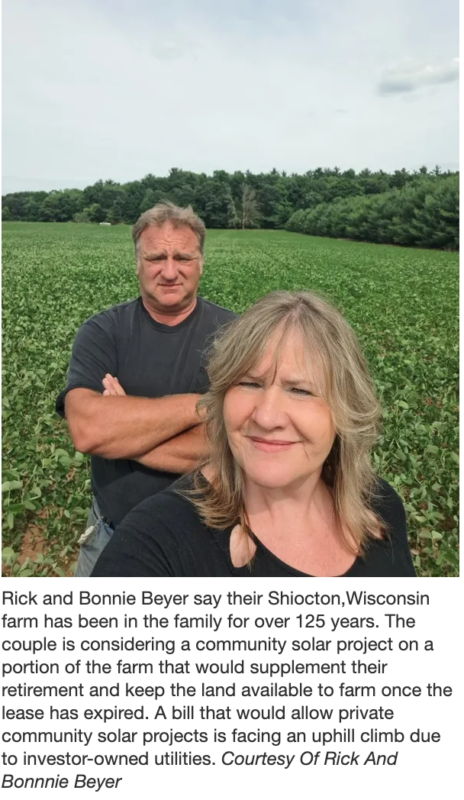Wisconsin State Farmer story link
By Colleen Kottke
Over the years, Rick and Bonnie Beyer have had many opportunities to sell their farmland for residential development. And each time, they turned the offers down.
“We always say ‘no,’ preferring to keep the land available for farming. It’s our family’s history, and we hope, will be a part of our legacy,” said Rick Beyer of Shiocton.
Nearing retirement age, the couple has signed a contract with a developer to place 30 acres of farmland into a community solar project. Currently, half of the land on the farm, which has been in the family for over 125 years, is enrolled in the Conservation Reserve Program while the remaining acres are rented out to a local farmer.
“Such a move would not only provide our family with income, it would keep the land available for farming in the future,” said Beyer.
Payments from community solar projects that allow landowners to voluntarily lease out portions of their property for small solar energy projects would be a boon to retiring farmers, he said.
“The payments from these projects to farmers would provide a steady income to help many of these family operations across the state weather the ups and downs of the agricultural economy,” Beyer said. “However, state law needs to change in order for these solar projects to become a reality. Right now, only big utility companies can operate such solar energy arrays in Wisconsin”
A group of Republican lawmakers have retooled a bill that would allow non-utility developers to create community-owned solar arrays.
Community solar bill faces uphill battle in Madison
This is the second time in recent years that GOP lawmakers have proposed legislation in favor of community solar. Co-author State Sen. Duey Stroebel, R-Saukville, said a similar bill introduced in 2021 never made it out of committee.
“Similarly, the 2023 community solar bill may run into a bottleneck at the committee level (again),” Stroebel said, adding that opposition stems primarily from the investor-owned utilities and smaller stakeholders economically tied to utilities. “It is not surprising that investor-owned utilities are against any energy policy that would free a single electron from their statutory monopoly.”
State Sen. Rob Cowles, R-Allouez, who signed on to the proposed legislation, says the bill allowing families like the Beyers to host community solar projects on their farmland is poised for an uphill battle.
“This legislation is a good thing, especially for farmers that are trying to save their property,” Cowles said. “(Passing the legislation) is going to be a heavy lift because of the power of the state utilities and their unwillingness to lose a piece of their current monopoly.”
Soon after the bill was introduced earlier this year, the Wisconsin Utilities Association (WUA) sent out a letter to members of the Wisconsin Legislature urging them against sponsoring the Community Solar bill.
Bill Skewes, WUA executive director, says proposed Senate Bill 226 and Assembly Bill 258 would give private solar developers free access to Wisconsin’s energy grid at no risk, while shifting costs to utility customers.
The proposed legislation supporting third-party ownership flies in the face of a regulatory agreement that utilities have had in place since 1907 that states regulated utilities and cooperatives are the only entities allowed to provide energy to customers.
“The bills shift the cost of paying for the electrical grid to non-participating (community solar) customers because if you are being served by a Community Solar farm, the utility that serves you still needs the infrastructure and capacity in place to keep your lights on when the sun isn’t shining. But because your meter isn’t spinning, your neighbors pay for your share of the grid,” Skewes said.
Small solar arrays would provide Wisconsinites more access to lower-cost solar power
Brandon Smithwood, director of government relations for Dimension Renewable Energy, says his company’s been developing community solar projects for over a decade in a number of states, and in states currently considering community solar legislation including Wisconsin and Ohio.
He says the reception from landowners — from small family farms to industrial landowners — has been positive.
“Landowners and communities are particularly interested in these smaller 30-acre projects over the vast 1,000-plus acre projects that utilities have been building,” Smithwood said. “A typical landowner wants to take a small portion of their less productive land and lease it for 25 years. At the end of the lease, the system can be entirely removed and the land returned to its previous condition.”
The company has a decommissioning bond in place with landowners to guarantee a fully-funded retirement of the project.
Stroebel says the proposed legislation aims to create local jobs, drive innovation and competition in the solar industry and lead to savings for Wisconsin ratepayers.
“Solar is rapidly growing across the country. Wisconsin currently prevents consumers from reaping the benefits of solar unless you are able to install panels on your roof,” he said. “This bill seeks to cut red tape and allow community solar in our state. Currently, 20 other states allow community solar.”
Creating competition and savings is a key point in Stroebel’s support of the bill, which he dubs a conservative approach to renewable energy policy.
“This is about providing energy without subsidies, without price support, and it needs to stand on its own,” Stroebel told Milwaukee Journal Sentinel. “The investors who create these facilities will sell subscriptions and if they can deliver power more cost effectively than the monopoly power providers in our state, they’ll sell power.”
Skewes refutes lawmakers’ claims that community solar would add competition to the state’s solar market.
“Competition usually sounds good for most economic transactions, but the only beneficiaries of competition under this bill will be the developers who get access to our customers’ grid,” Skewes said. “What is competitive about a developer passing legislation so that another business is required to buy all of the output, even if that output is not needed? That’s a textbook definition of a government mandate.
“Unlike utilities, the developers have no obligation to serve. They are cherry-picking customers and are not bound to provide reliable service at all times. Customers want reliable and affordable service — what does this bill to advance either of those?” he added.
Many utilities like Alliant Energy already offer community solar programs in communities like Fond du Lac, Wisconsin and Cedar Rapids, Iowa, Skewes said.
“Utility-sponsored community solar gardens differ from what lawmakers are proposing because they can be done at scale. The costs are lower per KWh, roughly by half,” Skewes said.
Smithwood contends that utility-sponsored community solar projects are limited and charge customers more for a resource that should be saving them money.
“When the utilities argue that they don’t need competition because they have their own offerings for customers, it’s akin to them saying they’ll offer some people a Yugo and that no one should be able to buy a Ford, Chevy or Honda,” Smithwood said. “Wisconsinites should have choices and benefit from competition and not simply have whatever a monopoly feels inclined to offer.”
RENEW Wisconsin calls solar panels ‘drought-resistant crop’
Farmers exiting dairying or simply looking to retire often turn to their land for a stable source of income. Many rent out the cropland to other farmers while some sell the land to developers looking to build rural subdivisions.
“We don’t have any children, so we’re kind of at the end of the family. Something is going to happen to this property one way or another. If we fill it up with three-bedroom homes, then the property is done forever,” Beyer said.
Community solar expansion would allow more Wisconsin farmers to lease their land to host solar arrays and receive a guaranteed secure income for 25 years or longer. RENEW Wisconsin says this drought-resistant cash crop is especially valuable for Wisconsin’s agricultural communities facing economic stress.
According to the Madison-based clean energy organization, the soil underneath the panels can be planted with a variety of native plants and perennials. In addition to minimizing agricultural runoff and fixing nutrients in the soil, these perennials create a high-quality habitat for bees, butterflies, and other insects that move pollen in and around the fields and improve farm productivity.
Beyer says when the solar panels have reached the end of their useful lives or the contract expires, the equipment can be removed, and crop production can resume on the land that has become more fertile as a result of the native plantings.
“If we go with the solar program, 25 years from now another generation will have their own choices to make about the land,” he said.
Solar developments could serve as boost for local governments, communities
Another supporter of the bill, Rep. Scott Krug, R-Rome, said local control is another important facet of the bill.
“Unlike the 1,000-plus acre utility-scale solar developments that only have oversight at the state level, local government and residents would have direct say in the approval process for smaller community solar projects,” Krug said. “If signed into law, this bill would require a two-thirds majority vote by the local government to approve these projects.”
He also noted that most community solar arrays — typically 30 acres in size — are much smaller than the utility-developed mega-sized solar farms that typically generate opposition from local residents.
Cowles says around 14 groups have come out in support of community solar programs, including the Farm Bureau Federation, Wisconsin Property Taxpayers Inc., and League of Wisconsin Municipalities and clean energy advocates like RENEW Wisconsin.
“I think these families trying to save the family property by getting income off the farm are in a tough situation. With farms getting bigger and bigger, it’s hard for the small guys to survive,” Cowles said. “This is a way to generate some money for farmers to keep the farm. But you have to find the money to do it.”
Farmers and those who want to utilize solar energy to help support farming in the state and help their neighbors save money with clean energy should have the chance to do so, Beyer said.
“Our farm has been here for 125 years. Community solar could keep the land in production for another century, but only if lawmakers allow it.”

